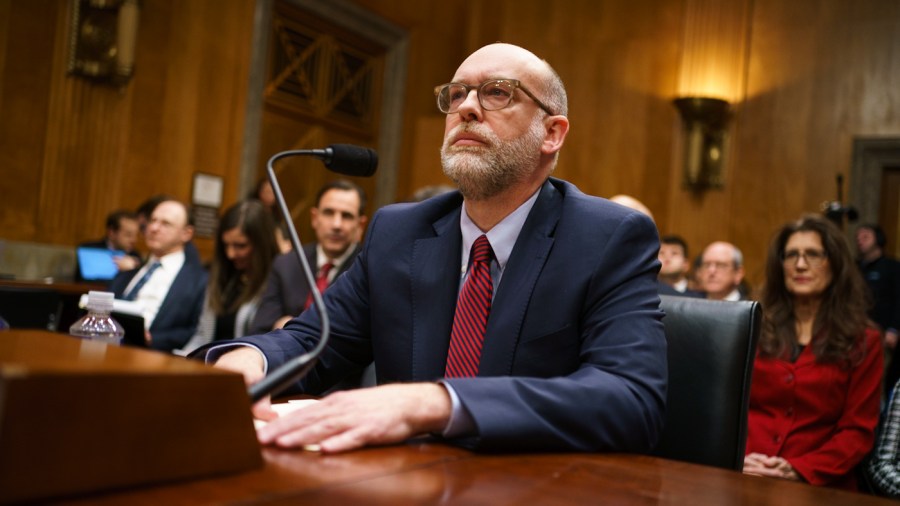
The Senate’s confirmation hearing of Russell Vought, one of Washington’s staunchest advocates for cutting spending, offered a preview Wednesday of the bruising spending wars likely to consume Congress this year.
Vought, President-elect Trump’s nominee for Office of Management and Budget director, a role he served in Trump’s first term, was at the helm of the budget office during the longest government shutdown in history in 2018 and 2019. Before that, he advocated for brinkmanship tactics to score policy wins.
He also advocated for reprogramming congressionally appropriated military construction money to pay for construction of the U.S.-Mexico border wall, and for withholding funds to Ukraine — two issues that came up at his fiery hearing.
Vought, a former executive director of the House Republican Study Committee when it was the Freedom Caucus of its day, is viewed as more ideologically aligned with the fiscal conservatives who have roiled House debates over spending than with GOP leaders who have agreed to bipartisan deals.
He is expected to cruise to Senate confirmation, like Trump’s other nominees, despite the misgivings of some Republicans who are leery of his affiliation with Project 2025, the conservative policy playbook that became a magnet for controversy during last year’s election.
Vought has been a leading proponent of converting thousands of federal civil servants to “Schedule F,” which would allow Trump and his lieutenants to fire thousands of nonpolitical federal workers if they balk at carrying out his bold initiatives.
Fiscal conservatives are eager to have a White House budget director who will draw a hard line with Congress on spending.
“We need someone with the strength of character like Mr. Vought to put the foot down, to put the hammer down and say, ‘Enough is enough,’” said Sen. Rand Paul (R-Ky.), the chair of the Homeland Security Committee, who hosted Vought’s confirmation hearing.
Paul, a leading budget hawk, called Vought a “consistent advocate for fiscal sanity” and predicted he would be “swiftly confirmed.”
If confirmed, Vought would play a leading role in negotiating the government spending deal Congress needs to pass by March 14 to avoid a shutdown.
Vought advocated for pushing the fiscal 2025 spending bills into the new Congress to give Trump and the Senate Republican majority more input into its top-line spending number and funding priorities.
He warned in an interview with Real America’s Voice in September that passing an omnibus spending package while President Biden was still in office would fund the federal government at “woke and weaponized high levels of bureaucracy” for a quarter of Trump’s second term.
Vought will play a central role implementing the deep spending cuts that will be recommended by Elon Musk and Vivek Ramaswamy, the co-chairs of Trump’s new “Department of Government Efficiency.”
Senate Democrats grilled Vought on Wednesday over his past support for using government shutdowns to win policy concessions.
“You have repeatedly, Mr. Vought, called for brinksmanship around government shutdowns and opposed bipartisan deals to keep the government open,” Sen. Maggie Hassan (D-N.H.) said in one pointed exchange with the nominee.
“In 2011, for example, you wrote in an article that Republicans must simply be prepared to shut the government down … and need to dig deep and embrace the sort of brinksmanship that shows they are playing to win,” she said.
Vought distanced himself from those comments, insisting he wants to play a constructive role in passing the annual spending bills — something Congress failed to do last year.
“Senator, I don’t think I have been a person that has wanted to have government shutdowns. I’ve had to be the one that kept the government open consistent with the law for the longest shutdown in history. I know the impact it has on the federal government,” he said, referring to the 35-day shutdown during Trump’s first term that was sparked by a fight over funding the southern border wall.
But Hassan and other Democrats on the committee didn’t seem persuaded Vought would step back from bare-knuckle tactics as Trump’s budget director.
“Unfortunately, this is a situation where there seems to be kind of a confirmation conversion, because your words in articles and talks reflect a different view about the use of government shutdowns,” she said.
Sen. Gary Peters (D-Mich.), the ranking member of the Homeland Security panel, grilled Vought over his support for using presidential authority to withhold congressional spending.
Vought in an interview with Fox Business last year said the “loss of impoundment authority” was “the original sin in eliminating the ability from a branch on branch to control spending.”
“We’re going to need to bring that back,” he said.
That view drew a sharp rebuke from Peters.
“During your time at OMB, you consistently ignored laws passed by Congress that directed how taxpayer dollars should be spent,” he said.
He pointed to an investigation by the Government Accountability Office (GAO) that found the budget office under Vought violated the law eight times during Trump’s first term by directing certain federal agencies to operate during the 2018-19 shutdown.
And he noted another GAO finding that the budget office under Vought violated the law by withholding vital security existence to Ukraine.
“If you are confirmed as OMB director again, do you commit to follow the law and not allow OMB to withhold funding from programs that Congress has appropriated?” Peters demanded.
Vought disputed the GAO’s characterizations of his actions as OMB director and pointed out that Trump argued during the campaign that the Impoundment Control Act, which bars the president from withholding congressional funding, is unconstitutional.
“We have seen to the extent this law has contributed to waste, fraud and abuse,” he said.
He said whether Trump decides to claim impoundment authority to block congressional funding on certain priorities is “something his team would have to consider when they are confirmed in [their] roles.”












